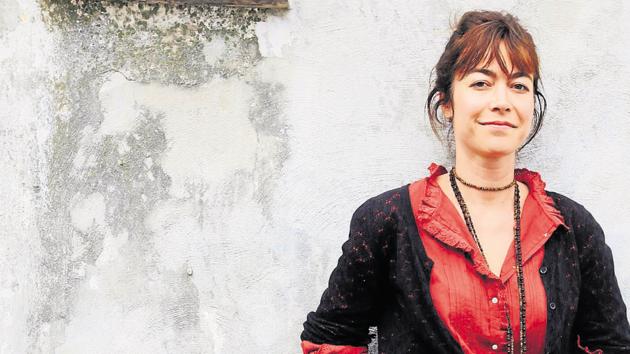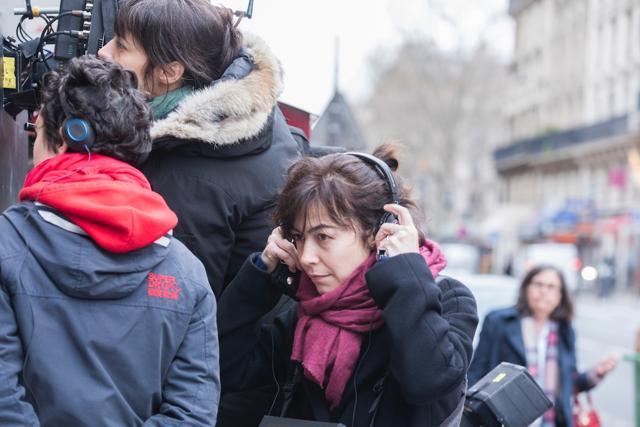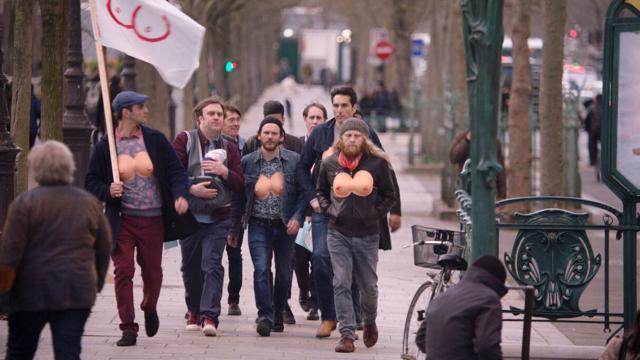It is ridiculous to deprive the sanctuary of cinema: Eléonore Pourriat
French writer-director Eléonore Pourriat does not support the exclusion of movies made for online streaming platforms from the Cannes film festival.
Having acted in a few French films including Benoît Cohen’s Tu Seras Un Homme (2013), Eléonore Pourriat shot to fame when Oppressed Majority, the short film written and directed by her, was released on YouTube in 2014. It garnered the artiste international acclaim and landed her a feature film deal from an online streaming portal.

Pourriat, who awaits the film’s release next week, shares her thoughts on world cinema, the importance of inclusion to break barriers in art and the one-word solution for equal opportunities to women. Excerpts from interview:
What are your thoughts on the digital platform? How does it’s growth affect cinema?
As a movie buff, I enjoy going to the cinema, sitting in the dark with strangers, sharing the sacredness of the film and having my emotions increased tenfold by the electric atmosphere. Nothing compares to this experience. However, I definitely prefer having my film available on a digital platform than vanishing after one or two weeks in theatres, which is what happens in France to most films.
It is a complex situation. Adjustments have to be made, especially in France where we have a wonderful system protecting writers and directors, but we need to embrace the evolution to get the best out of it, instead of trying to prevent it — for example, the exclusion of Netflix films from the official competition in Cannes festival — It is ridiculous to deprive the sanctuary of cinema from fantastic artistes such as Bong Joon-ho (South Korean director).
We still have limited number of females behind the camera. What are the changes that can help better these statistics?
In one word, quotas. All the commissions delivering subventions and the selection committees in festivals should be gender-balanced.

A common grievance of feminists is that sensitivity towards race and religion lacks while addressing larger issues of women. Your thoughts on it..
My definition of feminism is ‘inclusiveness’. I have faced too much prejudice from sexism, not to be aware of what people of colour or followers of a minority faith have to endure.
Is the Bechdel test is relevant in today’s times? Also, is it truly a failproof method to ensure correct representation of women in movies?
The Bechdel test is better than nothing. It is not a proof of artistic quality but it works as a gauge of sexism in several fields, such as movies, video games, books and plays. I see it more as a safeguard than an effective test. I don’t think it should be applied as a rule, although it appeared in Alison Bechdel’s comic strip as ‘the rule’. It is a precious proposition because it offers people an alternative vision of art, more faithful to reality. It points out the normative representation people don’t even notice anymore. Tests for the representation of non-white or LGBTQ characters are extremely eloquent too.
Do you feel that women are more susceptible to be burdened by religious sentiments even today ?
Things have changed in France since 2009 when I shot Oppressed Majority. Islamophobia has become a social plague. I did not want a scene of my film I Am Not An Easy Man to be exploited by people who mistake religion for extremism. I chose to use a real event that occurred in a French restaurant in 2016, when the owner refused to take two women’s order because they were wearing veils, and asked them to leave his place. I felt I had to take position in this typically French debate about Islam. I respect the choice of women, whether they want to wear veil or shave their head or wear a mini skirt. Through my work I fight against the lack of choice, and discrimination.
What is your message to youngsters out there so that we have a world of more equal opportunities in the future?
I feel empowered by female solidarity, whether in India with events such as Project Blank Noise, Pink Chaddi Campaign, or more recently all around the world the #MeToo momentum, the 50-50 in 2020 initiatives for parity, the raising of funds in US for victims of abuse and sexual harassment, the formation of female think tanks in France, we are stronger together. Actually, despite what we have been told for so long, we women are strong and should never forget it. We will face backlash — it is inevitable in progress periods — but things will never be the same if we stick together.

What have been some of the blatant sexist criticisms on your works?
The success of my short film brought me the best and the worst of what internet offers: I’ve been contacted by Netflix on a social network and received at the same time encouraging compliments from women and men all over the world as well as insults from misogynous cowards hidden behind their screens.
In 2010, I was sometimes asked if making a feminist film was relevant since French women had the same legal rights as men. I don’t think I would be asked that question today in the wake of the Weinstein case and the freer speech of women about abuse and harassment. Some people say the society I depict is a caricature, but I reply them our societies are caricatures. Male supremacy is the most widespread cliché. It creates stereotypes and asks people to fit their tiny moulds, but it is pure deception.
Watch the trailer of I Am Not An Easy Man
What has been your inspiration behind taking up feminist film projects?
I do not intentionally take up feminist projects. I am a feminist, and, as a woman, I need to see women represented through a female gaze. I draw my inspiration in a lack of visibility of empowered women. In every field, we women have been shown male models although we comprise 50% of the world population. As a child, I had a hard time identifying with male characters. As a student, I have read few female writers. As a director, I needed to show women in situations men have been assigning to men. I also wanted to allow men to embody what is usually attributed to women — vulnerability, sensitivity, gentleness — emotions men are supposed to hide according to patriarchal standards. Moving to New York City inspired me a lot. I got to challenge my conception of gender in a city where you can choose your gender identity. Hence, at the core of I’m Not an Easy Man lies the following question: what is feminine?
How is the experience of directing and acting in the same project?
I had enjoyed directing my short film, Oppressed Majority, so much without feeling any frustration of being only a director that I did not think I would act in my feature film. But the part of the psychiatrist inspired me and imposed itself upon me, maybe because of the parallel between psychoanalysis and cinema. As a director, I am intent on what the actors do not control, what of themselves escapes them. If I had not been a director, I would have gone back to university to become a therapist. Playing this small part was a fantasy come true.
Your earlier short film was released on YouTube and the current one is on Netflix, a digital streaming platform. Do you think the audience is still not ready for such a film to be released in theatres?
Thanks to the buzz that happened in 2014 with my short film Oppressed Majority, Netflix contacted me. The fact that a digital platform releases my first feature film today is coherent with the way I chose to share my short film on YouTube with an international audience in 2014. I’m Not An Easy Man will be released at the same time in 190 countries on April 13. Having one’s film shown to the largest audience is the dream of any director. However, I do not think that the audience is not ready for such a film to be released in theatres. All around the world, people are thrilled to be surprised, challenged or even shaken by films or plays. The problem comes from some producers and studios that try to figure out what people need and tend to follow a recipe, favouring a marketing approach over artistic creation and originality.
What are your thoughts on racial representation in movies? In that regard do you feel I Am Not An Easy Man truly represents the racial diversity that we see in present-day France?
I think we are very far from representing the French diversity in French films, and this concern leads to a contradiction I had to face while preparing my film because the matriarchal reversed society I show in I’m Not An Easy Man is a mirror of the French patriarchal society. It is not better. It is unequal. It is a white male supremacy. My leading female character had to be white because she has the power and never encountered any obstacle to get it. Her boss had to be white because the overwhelming majority of editors in major French publishing houses are white. As for Damien, the male hero, I needed a white alpha male, who has never experienced any discrimination before being catapulted into this reversed world where he discovers what other people undergo in his white man’s world.
Follow @htshowbiz for more
The author tweets @iamsusanjose






